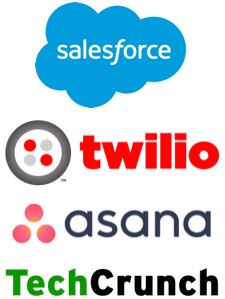So Who Is This Dan Kaplan Guy, Anyway?
That's me on the right.
I started my career as a long-form magazine journalist while still in college, getting paid good money to write 3,500-10,000 word stories on some pretty nifty things. I was busy dreaming of The New Yorker when I realized that the business models supporting the kind of writing I loved to create were facing extinction.
During my senior year (2005), I decided that technology would be my future, and started a company with a friend from the engineering school. Our original vision involved developing a machine learning technology that would help knowledge workers overcome email overload.

We pivoted away from the email problem when it became clear we were in over our heads, and built a competitor to StumbleUpon instead. We got that product to about 50,000 users, but not much further before we failed.
After bouncing back, I re-discovered my voice in technology product marketing. I got my first product marketing job at Salesforce, then went on to Twilio and then Asana.
I scored my first big win at Twilio, when I led a project to overhaul the website’s SEO and increased traffic more than 30% in two months. I scored another win when a guest post I wrote for TechCrunch drove over 50 new leads to Twilio's sales team.
After a number of conversations with startup founders and marketers, I concluded that great product marketing was both essential and seriously lacking among technology startups. I decided to maximize my impact by focusing on consulting and have been working on my business and writing columns for TechCrunch ever since.
Sure, But How Can We Be Sure Dan Kaplan Knows What He’s Talking About?

In my time inside two well-funded SaaS startups and even more since I’ve been consulting, I’ve seen first hand the unfortunate, expensive, and sometimes outright destructive things that happen when founders and their teams don't invest in building solid marketing foundations,
The startups I’ve helped since becoming a startup marketing consultant have seen sales increase by 150% and more within a matter of months.
Meanwhile, the essays on the future of technology that I write for TechCrunch get shared by thousands of people and consistently rank in the top 10 for traffic on TechCrunch the week they are published.
And unlike other startup marketers or marketing agencies who focus on fleeting "hacks" and vanity metrics, I've created a unique system that combines the best product, marketing, and sales wisdom of the last 76 years with the absolute most effective (always changing) marketing and sales tactics in use today.
My Foundational Story Framework helps founders, product people, and marketers align their teams, build great products, launch them brilliantly, and create sustainable, systematic growth.
This Foundational Story Framework Sounds Interesting! Tell Me More.
In a nutshell, the Foundational Story Framework uses three "foundational" stories to give you and everyone on your team clear, compelling, and consistent answers to the most important strategic and tactical questions anyone (including YOU) might have about your startup:
They are:
- The Origin Story clarifies your product, marketing, and sales strategies and helps you get your whole team on board. It also helps with building culture, hiring, fundraising, and making sales.
- The Story Of Transformation perfects your marketing and sales messages and focuses your near-term product roadmap on the most critical/impactful new products and features.
- The Epic Vision sells the dream to everyone whose support and perseverance you'll need if you're going to follow through on your ambitions: loved ones, co-founders, key hires, investors, etc. It helps prevent "shiny object syndrome" from stealing your and your team's focus, slowing you down, or even sending everything off the rails. Perhaps most critically, it helps you manage their (and your) psychology through the inevitable emotional rollercoaster ride of startup life.
I created the Foundational Story Framework because I love (most) tech and have seen far too many promising technologies, products, and even whole companies fail because of their weak marketing foundations.
You can learn a whole bunch about it by clicking here.
But All Of This Sounds Like A Big Investment Of Time. Why Should I Prioritize My Foundational Stories RIGHT NOW?
What would it mean for your startup if:
- Every new product you launched added tens of thousands, hundreds of thousands, or even millions of dollars to your revenue?
- Your website and all the content you produced reliably brought in more qualified traffic, leads, and sales?
- You could safely raise your prices by 10-25% or more?
It doesn’t matter if you’re taking your startup from promising product to initial traction, from traction to growth, or from growth across the chasm to the mainstream. If you invest in getting your foundational stories right, you dramatically increase the probability of creating something that lasts.
But Don’t Just Take My Word For It. Here It Is,
Straight From A Handful Of Clients:
Three big things happened after Dan re-did our site: 1) Our sales are way up. Now 166% month over month growth. 2) 1 in 5 customers are purchasing our product without ever speaking to a sales person. This did not happen before Dan's revamp. 3) We receive quite a bit of feedback on demo calls where people say ‘I’ve read the site and I get it.’ This also never happened prior to Dan's revamp.
 Zac Auger
Zac Auger Head Of Sales, Framed.io
We knew we had a compelling product (people who used the product loved it), but our funnel was not converting. Dan came in and understood our business really quickly. In the first conversation, he just "got it" in a way that most consultants don't.
In the course of working with Dan, we increased sales by 150% , which allowed us to start using paid acquisition channels that were previously not profitable. This was a BIG win, and we continue to use the building blocks that Dan created for us.
But I also loved to see his process.
Rather than jump to solutions or conclusions, he started with first principles: talking to the users–current, past, churned, abandoned carts–you name it. He really knows what questions to ask to really get insight into why people are deciding to buy or not buy the product. In a 15 minute call, Dan was able to get through 10+ meaty questions, and get 2-3 pages worth of really valuable insights.
He'll very quickly understand your users as well as or better than anyone on your team.
 Gautam Tambay
Gautam Tambay Co-Founder, Springboard
In a single, short phone call, Dan gave us three actionable ideas that we could start working on immediately. I learned how to ask customer discovery questions and then pitch a solution that addresses the questions and pain points raised. I learned the importance of creating resource pages on our site, packing them with remarkable content, and including a prominent opt-in. And I learned which marketing tools would help us the most, right now.
 Stuart Levinson
Stuart LevinsonCo-Founder, OpenCompany
Ready To Nail Down Your Foundational Stories?
Here's how to get started in two steps:
- Click the button below:
- Fill in the short application that apears
- That's it! If I'm confident that you and your company can definitely get major benefits from my help, I'll reach out within one business day to schedule a completely free 30-45-minute strategy consultation call.
NOTE: This strategy consultation will NOT simply be a long, drawn out sales pitch. Instead, I will ask you about your company, product, team, and your most important 90-day goals. From your answers, I will help you discover a handful of IMMEDIATELY actionable improvements you can test that same day.
These improvements might include: 2-3 more compelling headlines to test on your homepage, product pages, or landing pages; a handful of more persuasive opt-in offers for your blog. A better email follow up sequence for new users and potential customers.
I'll offer you all of these suggestions 100% free of charge because I love helping people with their marketing AND because I know that if you find my suggestions insightful and valuable, there's a good chance you'll want to become a customer.
And even if you don't become a customer right then and there, I'm confident that you'll remember the value I gave you for free. Maybe you'll even tell a few people. And that's good enough.
Sound good?
Then click the button and fill out the application that appears!